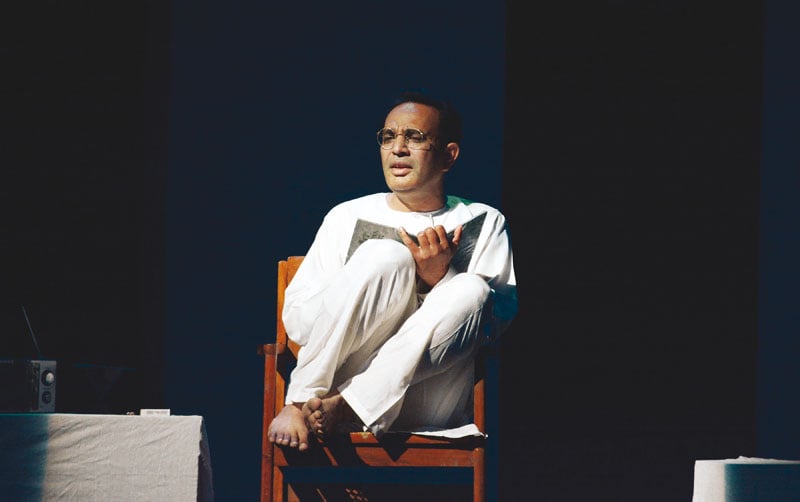
Whether or not they agree with his ideas, anyone with a passing fancy for Urdu literature recognises Saadat Hassan Manto. Some critics argue that he was ahead of his time or, maybe, society itself was far behind. Infamous for his bold stance against the status quo, the 20th-century storyteller and short-story writer has garnered fame posthumously. In a tribute to his literary genius, a play titled Manto Se Miliye was staged at the Pakistan National Council of the Arts Tuesday evening.
Scripted by Dr Shaista Nuzhat, the play offered a series of flashbacks, which lent insight into the life of the multi-faceted Manto. It depicted his love for his family and penchant for writing, which was also his sole means of sustenance, and the meagre resources that forced him to indulge in heavy smoking and drinking, which proved to be detrimental to his health.
Actor-director Afzaal Nabi, the lead character in the play, effortlessly transformed into the role by not only donning Manto’s signature white kurta pyjama, but also by recreating the writer’s lanky posture and animated persona. He is shown seated with his legs folded with a cigarette perched on his lip, squinting in concentration, with his hair falling between his eyes, as he scribbles away on a notepad with a kaafi playing in the background. The play showcased the poster image of Manto that most people identity with in popular literary culture.

The play showcased the poster image of Manto that most people identity with in popular literary culture. PHOTOS: HUMA CHOUDHARY
But, of course, there was a lot more to the writer who refused to be bogged down by irony and social ills. In an interview ahead of his performance, Nabi said, “Manto was a great writer, whose stature could not be given befitting recognition. He lived and died in circumstances indeed not enviable for many.” Speaking about the challenges in performing Manto’s character, he said that Manto was a difficult person; he was egotistical and avoided helping anyone. He added that since he had never met Manto, his research involved reading up on him, referencing old photographs and seeking advice from author Mustansar Hussain Tarar, who was Manto’s neighbour at one time.
The small-framed Dr Zoya Qazi rendered Manto’s wife Safiya’s character, emulating a woman who was repelled by her husband’s compulsive drinking habit and unabashed creative expression, which often landed him in trouble. Her subtle nit-picking characterised the marriage trivia alongside bringing up three daughters in a modest household.
Qazi, who has been associated with film and theatre for some time, expressed that the play aimed at making the public learn something and bringing about some positive change in society. “I feel many people have deviated from theatre altogether and they remain oblivious to personalities, such as Manto, Baba Bulleh Shah and Hazrat Shah Hussain.” She stated, “It’s important to highlight these people, so that our coming generation knows about them and their contribution to society and humanity at large.”

The play showcased the poster image of Manto that most people identity with in popular literary culture. PHOTOS: HUMA CHOUDHARY
Chronicling the smooth decline of a freethinker, the play had a melancholic undertone of standing for one’s ideals in the face of adversity and heavy criticism. Its deliberately slow pace symbolised the misery of a life of turmoil. Nuzhat sent a powerful message across as she restated a line from the play, that people should only critique Manto after they have read and tried to comprehend his writings as opposed to blindly dismissing him and his stories.
“Manto remains inimitable. He wrote how he saw things and was always unapologetic about that. I find this quality admirable. He held up a mirror to society, which, unfortunately, many could not digest,” commented Asma Khan, an academic and guest at the play. She added that the play was a commendable effort towards taking Manto’s legacy forward and inspiring tolerance among people.

The play was organised in collaboration with Mass Foundation, which has been working to promote theatre and raise awareness about poignant and socially-relevant themes for about a decade now. The production team has also performed the play in Lahore.
Published in The Express Tribune, February 5th, 2015.
Like Life & Style on Facebook, follow @ETLifeandStyle on Twitter for the latest in fashion, gossip and entertainment.
COMMENTS (2)
Comments are moderated and generally will be posted if they are on-topic and not abusive.
For more information, please see our Comments FAQ





1732947071-0/BeFunk_§_]__§-(4)1732947071-0.jpg)











One of the greatest short story writer ever lived. One of the greatest satirist ever lived. But above else he is one of the greatest humanist ever lived.
These third rate NGO types, copycatting westoxicated ideas can never ever do justice to a Manto....WE need people from galli mohallaas, bazaars, the talented ones and not the art-school theater "educated" riffraff to truly admire and respect manto. Manto needs to be performed by and for the street ones...not the Colony suburb slaves